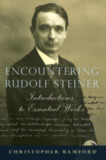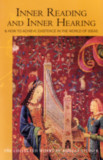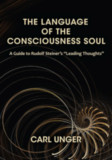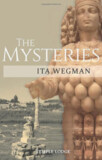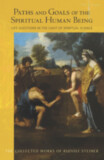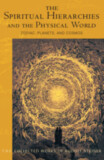Human Questions and Cosmic Answers
(CW 213)
- Publisher
Rudolf Steiner Press - ISBN 9781855846685
- Language English
- Pages 248 pp.
- Size 6" x 9.25"
13 lectures, Dornach, Switzerland, June 24 – July 22, 1922 (CW 213)
“In the case of a solar eclipse, the evil that has spread over the earth can be carried out into the cosmos to wreak more havoc there, whereas in the case of a lunar eclipse, people who absolutely want to be possessed by evil thoughts can receive them from the cosmos.” — Rudolf Steiner
In this first full translation of Human Questions and Cosmic Answers, Rudolf Steiner implores his listeners to recognize the connections between the material and spiritual worlds. Eclipses of the Sun and Moon, for example, are “forces at work in the universe, just like those we study today in the clinic or in the chemistry or physics laboratory.”
Even ordinary thinking can strongly affect our outer world. Materialistic thinking, he says, can literally atomize our surroundings: “If all human beings start to think that everything has to be explained in terms of atoms...then the earth will actually turn into atoms...these false ideas create false realities.” Steiner speaks of the “world of will” as three-dimensional, the “world of feeling” as two-dimensional, and the “world of thinking” as one-dimensional. The “I” itself is without dimension. Only inner, living thinking can grasp the spiritual mental realm.
Steiner also discusses significant cultural figures, including Friedrich Nietzsche, Herman Grimm, and Julian the Apostate. He also introduces other topics, such as the effect of planetary forces on humans; the healing effects of metals and other substances; the revitalization of thinking through meditation and concentration; the effects of separating science, art, and religion; and the necessary transition from philosophy to anthroposophy.
This volume is a translation from German of Menschenfragen und Weltenantworten (GA 213).
C O N T E N T S:
Introduction by Elizabeth Marshall
1. June 24, 1922: Relationships between the spiritual-mental and the spatial-physical. Three-dimensional world of will, two-dimensional world of feeling, one-dimensional world of thinking. The “I” is dimensionless. Only inner, living thinking can grasp the spiritual-mental
2. June 25, 1922: Relationships between the human soul and the light of the sun and moon. Solar and lunar eclipses. Human questions and world answers in the ancient mysteries and in modern initiation.
3. June 20, 1922: Human and cosmos. Will (sun) and thoughts (moon). Effect of planetary forces on humans. Healing effects of metals. Human knowledge and world knowledge.
4. July 1, 1922: The planets and human soul life. Humans and world in life on earth and in life between death and new birth. On earth many people and one world; between death and new birth many worlds, but only one human nature.
5. July 2, 1922: The earthly substances in nature and their healing effects. Slate, lime, oxygen, nitrogen, carbon.
6. July 7, 1922: Franz Brentano, scholastic philosophy, and modern science. Brentano’s life, his relationship to the doctrine of revelation and the dogma of infallibility. His “psychology” and his “teaching of Jesus.”
7. July 8, 1922: Franz Brentano. The ancient mysteries and the modern separation of science, art, and religion. Knowledge and faith. Last attempt at unification in German idealism. Fichte, Schelling, Hegel. Brentano, Faust of the 19th century.
8. July 9, 1922: Belief in revelation, scientific theory, and the heritage of philosophy presented by Franz Brentano, Adolf Fick, and Richard Wahle. Necessity of the transition from philosophy to anthroposophy. Revitalization of concepts and ideas through meditation and concentration.
9. July 14, 1922: Franz Brentano and Friedrich Nietzsche. The scientific attitude of the 19th century. To understand the human being, it is necessary to understand the threefold nature of the human organism. The significance of doubt and conviction in external nature and in the cosmos. The task of spiritual science.
10. July 15, 1922: Franz Brentano, Friedrich Nietzsche, and the scientific intellectual movement. Their connection with old worldviews. Revelation and reason-based knowledge in scholasticism. From these developed dogmatic belief and mysticism (luciferic), as well as modern natural science (ahrimanic).
11. July 16, 1922: Origin of the Christian revelation content in the initiation knowledge of early Christianity. The downfall of the latter in the 4th century. Plato, Aristotle, Plotinus, Ammonius Saccas, Iamblichus, Julian the Apostate. Rome’s fight against the old initiation principle.
12. July 21, 1922: Symptomatological aspects of contemporary consciousness over the past fifty years. Paul Heyse’s Children of the World. Du Bois-Reymond’s Limits of Natural Knowledge. Herman Grimm’s Invincible Forces. Franz Werfel’s drama The Mirror Man.
13. July 22, 1922: The spiritual and mental aspects of human beings in relation to their spiritual and mental environment. Cosmic view of the world through imagination, inspiration, and intuition. Plants, animals, people in relation to the cosmos and earth. Gregor Mendel as characteristic of the nineteenth century (on his 100th birthday).
NotesRudolf Steiner’s Collected Works
Significant Events in the Life of Rudolf Steiner
Index
Rudolf Steiner
Rudolf Steiner (b. Rudolf Joseph Lorenz Steiner, 1861–1925) was born in the small village of Kraljevec, Austro-Hungarian Empire (now in Croatia), where he grew up. As a young man, he lived in Weimar and Berlin, where he became a well-published scientific, literary, and philosophical scholar, known especially for his work with Goethe’s scientific writings. Steiner termed his spiritual philosophy anthroposophy, meaning “wisdom of the human being.” As an exceptionally developed seer, he based his work on direct knowledge and perception of spiritual dimensions. He initiated a modern, universal “spiritual science” that is accessible to anyone willing to exercise clear and unbiased thinking. From his spiritual investigations, Steiner provided suggestions for the renewal of numerous activities, including education (general and for special needs), agriculture, medicine, economics, architecture, science, philosophy, Christianity, and the arts. There are currently thousands of schools, clinics, farms, and initiatives in other fields that involve practical work based on the principles Steiner developed. His many published works feature his research into the spiritual nature of human beings, the evolution of the world and humanity, and methods for personal development. He wrote some thirty books and delivered more than six thousand lectures throughout much of Europe. In 1924, Steiner founded the General Anthroposophical Society, which today has branches around the world.



